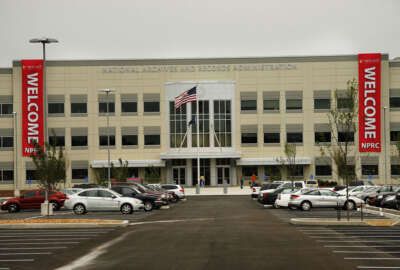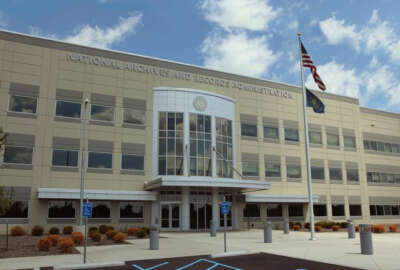House lawmakers eye TMF funding as possible solution to NARA’s records backlog
A bipartisan group of House members are urging the National Archives and Records Administration to apply for assistance through Technology Modernization Fund to...
A bipartisan group of six House members is urging the National Archives and Records Administration to apply for funding through the Technology Modernization Fund (TMF) to help address a backlog of pending records requests.
NARA has a backlog of roughly 500,000 outstanding records requests, a number that grew during the pandemic with much of the workforce at the National Personnel Records Center in St. Louis working from home.
NPRC usually responds to 1 million requests for military records each year. The vast majority of records responsive to those requests are paper-based; only 10% are available electronically.
Veterans need those documents to access certain burial services, medical treatment, home loans and other benefits from VA, and the Veterans Benefits Administration needs those records to begin processing disability claims.
The situation has frustrated members of Congress on both sides of the aisle, including House Republicans who have pushed the NARA workforce to return to work in-person.
The agency has recalled more employees back to work in-person, is hiring more staff and contractors, and is working with the Department of Veterans Affairs to digitize records.
Despite those efforts, NARA said it doesn’t plan to eliminate its backlog of 500,000 until the end of 2022.
For Congress, it’s not fast enough, and it sees the TMF as a resource for accelerating digitization and IT modernization efforts at NARA.
“We strongly believe that the digitization of NPRC’s records holdings fits both the objective and spirit of the TMF, and we urge NARA to apply for additional assistance through this important program,” House members, which include Oversight and Reform Committee Chairman Carolyn Maloney (D-N.Y.) and Ranking Member James Comer (R-Ky.), wrote Monday in a new letter to NARA. “It is critical that NARA use any and all available tools to ensure we can uphold our commitments to our nation’s veterans.
NARA and the Department of Veterans Affairs have partnered to digitally scan millions of paper military records, an effort that the agencies have said will help the National Archives respond to a pandemic-induced backlog — and set both organizations up for success in the future.
The agency is hopeful digital scanning efforts will begin next month, National Archivist David Ferriero told Congress last week.
In addition, the majority of NPRC employees — except those who have a COVID-19 reasonable accommodation — were supposed to return to work on-site last Monday. But COVID-19 infection levels in the St. Louis area where the NPRC is located have risen to levels of “substantial transmission” in recent weeks.
NPRC has dealt with 72 cases of COVID-19 among employees, the agency said.
“As soon as the public health data for the area where the Archives Drive is located falls within the CDC definition of moderate transmission, we will increase our occupancy limits so that most staff are working on site,” Ferriero said.
NARA has taken other steps to respond to the backlog. The agency is onboarding 100 new employees, and it’s doubling the number of contractors it has on site compared to pre-pandemic levels, Ferriero added.
Today, NPRC employees are handling 10,000 requests a week for the temporary loan of military records that VBA uses to adjudicate disability claims, which matches or exceeds pre-pandemic levels, the agency said.
NPRC is also handling about 12,000 records requests a week, compared to 3,000 weekly service requests earlier this year. Once more staff return on site, NARA anticipates a “significant increase in production going forward,” Ferriero said.
NARA asked the Defense Department in May to provide emergency assistance and help with sorting and digitizing files. Ferriero said his agency has fielded questions from the Pentagon about the request but is still waiting for a formal response.
NARA also established a remote call center in May, which is responding to 4,000 inquiries a week, and it improved its online application system that receives emergency records requests.
“These steps are important, but further action is needed,” House members wrote. “In particular, NARA could more quickly process the NPRC backlog with modernized IT systems. NARA has identified the need to digitize records as one of the biggest hurdles to addressing the backlog of veterans’ requests. Congress has provided substantial financial support for NARA to reach this goal. Although NARA has taken some steps to begin digitization, more significant action is needed to improve the agency’s IT infrastructure.”
Government Operations Subcommittee Chairman Gerry Connolly (D-Va.) and Ranking Member Jody Hice (R-Ga.), as well as National Security Subcommittee Chairman Stephen Lynch (D-Mass.) and Ranking Member Glenn Grothman (R-Wis.), also urged NARA to consider the TMF.
The TMF board has already received more than 100 proposals from agencies worth more than $2.1 billion, the White House said in a recent statement of administrative policy on a series of 2022 appropriations bills from the House.
That far exceeds the $1 billion in TMF seed funding Congress appropriated earlier this year through the American Rescue Plan.
Copyright © 2025 Federal News Network. All rights reserved. This website is not intended for users located within the European Economic Area.
Nicole Ogrysko is a reporter for Federal News Network focusing on the federal workforce and federal pay and benefits.
Follow @nogryskoWFED






